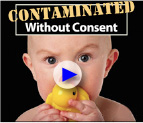October 10, 2011
Toxic BPA: Chemical Industry Claims American Baby Bottles and Sippy Cups Are BPA-Free Asks FDA for New Rule
Advocacy Groups Respond to ACC announcement, Demand Environmental Health Protections Now from bisphenol A (BPA) in can linings and thermal receipt paper
Washington, DC — The American Chemistry Council issued a statement on Friday about the synthetic sex hormone bisphenol A ( BPA) that some of its member companies produce, an endocrine disrupting chemical made from petroleum products used in canned food linings, thermal receipt paper, and many polycarbonate plastic products such as baby bottles and sippy cups. Nearly a dozen states have already implemented restrictions on BPA. California’s governor signed a bill restricting BPA this past week.
The National Work Group for Safe Markets, a coalition of environmental health groups including Clean and Healthy New York, Center for Health Environment & Justice, Natural Resources Defense Council, Breast Cancer Fund, and others, responded today to the announcement by demanding a phase out of BPA from the other products that expose people to the toxic chemical.
In recent years, the group released two national reports investigating BPA leaching from popular baby bottles and canned food sold at major retailers across America. The group demands that FDA resist industry pressure and institute a policy for phasing out BPA immediately, particularly in canned food.
“Three years after NRDC petitioned the FDA to revoke approval of BPA in these same products, the Agency still has not acted to protect the public," said Dr. Sarah Janssen, Senior Scientist with Natural Resources Defense Council. "Instead, the FDA seems to be looking out for the interests of large corporations. This is no way to carry out its mission. It's time for the FDA to do its job. More and more scientific studies studies demonstrate that BPA is a hormone disrupting chemical that affects the developing brain, reproductive system and can even increase the risk of cancer later in life. There is enough existing science now to show cause for removing this chemical from the marketplace. People, especially children, are continually being exposed while industry does its best to force delays by FDA.”
Laura N. Vandenberg, PhD, Center for Regenerative and Developmental Biology, Tufts University, comments: "Removing BPA from baby bottles was an important step to protect infants from exposure to this hazardous chemical. But what is being done to protect pregnant women and fetuses, as well as other vulnerable populations such as cancer patients? These individuals are not exposed to BPA from baby bottles. To prevent widespread exposures, we need to remove BPA from canned goods, reusable food and beverage containers, receipt papers, and the many other sources that have yet to be identified."
“France has just declared its intention to phase out BPA in all food sources,” says Bobbi Chase Wilding, with Clean & Healthy New York, “The US is lagging behind other countries’ protections from BPA. FDA signals they'll act on ACC's petition, but will they protect Americans from BPA in food can linings?”
"BPA has become a ‘line in the sand’ for the petrochemical industry as they fight having any regulations whatsoever,” explains Mike Schade from the Center for Health, Environment & Justice (CHEJ). “The chemical industry has invested millions of dollars lobbying against local and state BPA laws. They cite these very laws as a key reason why FDA should change food packaging regulations. The petrochemical association has wasted their members’ money, and should have invested that money in developing safer substitutions.”
Mia Davis of the National Workgroup for Safe Markets says “As a woman interested in starting a family, I'm glad that the chemical industry has stopped fighting parents and consumer advocates who were demanding safe, nontoxic bottles. The next step is clear: we want BPA out of all food containers, including the linings of canned foods, and we want to know that all of the chemicals used in these products are safe for moms, babies, everyone."
Dow Chemical, a BPA manufacturer, is a member of the ACC and another trade group, the North American Metal Packaging Alliance. Both groups have defended the use of BPA and insisted on it's safety based on flawed scientific studies. Two Dow Chemical studies from the 1970’s were used by the ICF research firm (whose clients included BPA manufacturers) to “prove” to FDA that BPA was “safe.” The obsolete Dow studies used by FDA in their earlier decision, now being revised, and pressure from the American Chemistry Council, prompted a Congressional investigation in 2008. Since then, alongside pressure from environmental health groups and more and more modern scientific studies being published on BPA, both the National Toxicology Program at the National Institutes of Health and FDA have stated some concern about the potential effects of BPA on the brain, behavior, and prostate gland in fetuses, infants, and young children.
Available for Interviews
- Bobbi Chase Wilding, Organizing Director, Clean and Healthy New York, No Silver Lining report co-author, 518-708-3875. Bobbi can address state and federal policies about BPA.
- Mia Davis, former BPA Coordinator for Clean Water Action, Co-Coordinator, National Workgroup for Safe Markets, No Silver Lining report co-author, 617-338-8131, x201. Mia is a young woman of child bearing age angry about having to worry about this, knows state and federal policy.
- Mike Schade, Center for Health, Environment & Justice, 212-964-3680. Mike can address market shifts and retailers pulling BPA products from their shelves and changes with manufacturers. Report co-author.
- Sarah Janssen, MD, PhD, MPH, Senior Scientist at Natural Resources Defense Council, 415-875-6126. Dr. Janssen can address health effects linked to BPA exposure and scientific integrity issues regarding the FDA regulatory process. NRDC has filed a lawsuit against the FDA for failure to respond to a petition filed in 2008 asking the FDA to revoke approval for BPA in food contact applications, including baby bottles and sippy cups.
- Laura N. Vandenberg, Tufts University School of Medicine, 617-636-0444, BPA researcher. Dr. Vandenberg can address the latest scientific studies on BPA.
- Janet Nudelman, Breast Cancer Fund, call Shannon Coughlin, Breast Cancer Fund, 415-336-2246. Janet can address Congressional policy on BPA, President’s Cancer Panel Report with BPA reference and EPA identifying BPA in context with TSCA reform.
- Anne Hulick, RN, MS, JD, Coordinator, Coalition for a Safe and Healthy Connecticut, Clean Water Action, 860-232-6232, 860-302-4861.
Resources
- Sarah Janssen's NRDC Blog
- Breast Cancer Fund's Response
- Baby’s Toxic Bottle, a report on BPA on plastic baby bottles, by National Work Group for Safe Markets
- No Silver Lining, a report on BPA in cans, by National Work Group for Safe Markets
- Consumer’s Union Can Testing Study
- Breast Cancer Fund’s BPA in Children’s Food Report
- Center for Progressive Reform White Paper Explodes Industry Myths about BPA
- Mind, Disrupted: How Toxic Chemicals May Change How We Think and Who We Are, A Biomonitoring Project with Leaders of the Learning and Developmental Disabilities Community. Biomonitoring report, including for BPA.
# # #




